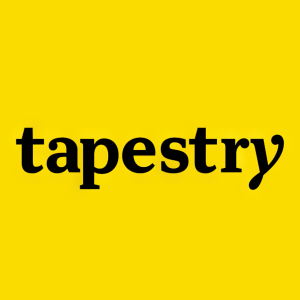Tackling Deforestation in Brazil: The Tapestry Foundation's Comprehensive Approach From the Ground Up
- Tapestry and WWF are partnering to develop deforestation- and conversion-free leather supply chains in Brazil
- The project has restored nearly 11,000 acres of pasture and riparian areas in the first year
- Reforestation targets were exceeded by 750%
- Tapestry aims to create lasting solutions that support responsible sourcing of leather and reduce deforestation
- None.
NORTHAMPTON, MA / ACCESSWIRE / June 21, 2023 / Tapestry, Inc.

The Cerrado
Elida Cristina Martins is standing next to an aerial photograph of her farm. The tree cover and jungle-like growth covering the property are easily observable. She is proud of the photo, set in a gilded frame, and once you see another picture, one taken nearly 20 years ago of the same area, you'll understand why. The comparison is stark - the older photo is of a modest white house with low-lying green behind it and a scrubby patch of dirt in front. There are no trees, no grass, no shade. This current version of Elida's farm is an oasis of different trees, shrubs, and other plant life has been thoughtfully integrated to maximize their symbiotic relationships.
Elida is part of an initiative led by the World Wildlife Fund (WWF) Brazil and funded in part by the Tapestry Foundation to rehabilitate degraded areas of the Cerrado biome, a vast savanna that covers the state of Moto Grosso do Sol in Brazil. Her farm, Boa Vida, is one of the sites where WWF is promoting the sustainable restoration of land that had been previously converted to ranch land for cattle grazing. The collection of native vegetation includes a diverse variety of plants, many of which are edible. This is agroforestry, the integration of trees and shrubs into crop and animal farming systems to create environmental, economic, and social benefits. In addition to improving the health of the land, this model offers an opportunity for comprehensive social impact.
The leather supply chain is long, complex, and opaque; in most regions of the world, there is little traceability of hides and leather as it moves through the value chain. Globally, habitat conversion for pasture is the largest single driver of deforestation. As part of a four-year, multi-faceted
In the short term, the grant is focused on social enterprise models that support the local community and environment. In the first year, the project has restored nearly 11,000 acres of pasture and riparian areas and WWF has held seven training courses to initiate seed collection community projects with 125 rural people reached through these courses (
In a recent visit to the Cerrado, Tapestry and WWF teams spent two weeks on the ground meeting with local people, including Elida, to experience first-hand the importance of centering local voices to meet immediate challenges while also creating long-term change. Year one of the pilot project reinforced that change cannot happen without the collaboration of communities, and that true innovation comes from testing and learning from new ways of thinking. WWF Brazil and the Tapestry Foundation outperformed year 1 targets for reforestation by
Tapestry, parent company of Coach, kate spade new york, and Stuart Weitzman, is dedicated to proving a deforestation and conversion free leather supply chain can exist in Brazil but we know a comprehensive approach is necessary and will take time.
Over the long-term, the project aims to create lasting solutions that support responsible sourcing of leather, reduce land conversion and deforestation, and restore what has already been degraded. Tapestry will be a key partner in scaling up important work led by WWF to the rest of the manufacturing sector and beyond to the rest of the cattle and leather supply chains in areas threatened by deforestation. Together this partnership will learn the best ways to shift the economic incentives leading bad actors to clear swaths of forested land (like cattle ranching and monocropping) to sustainable integrated solutions. While WWF tests solutions like agroforestry on the ground to reorient approaches around land use, Tapestry is working in conjunction with our industry on other commitments and pledges around deforestation and moving forward a DCF supply chain.
Deforestation is a complex problem that requires purposeful cooperation-the Tapestry grant with WWF allows collaboration with all stakeholders, from cattle ranchers to government decision makers, fellow fashion brands, to the communities living within proximity of areas feeling the worst effects of deforestation, to work together to change the system.
View additional multimedia and more ESG storytelling from Tapestry, Inc. on 3blmedia.com.
Contact Info:
Spokesperson: Tapestry, Inc.
Website: https://www.3blmedia.com/profiles/tapestry-inc
Email: info@3blmedia.com
SOURCE: Tapestry, Inc.
View source version on accesswire.com:
https://www.accesswire.com/762710/Tackling-Deforestation-in-Brazil-The-Tapestry-Foundations-Comprehensive-Approach-From-the-Ground-Up
FAQ
What is Tapestry, Inc. partnering with WWF to do in Brazil?
What has the project achieved in its first year?







